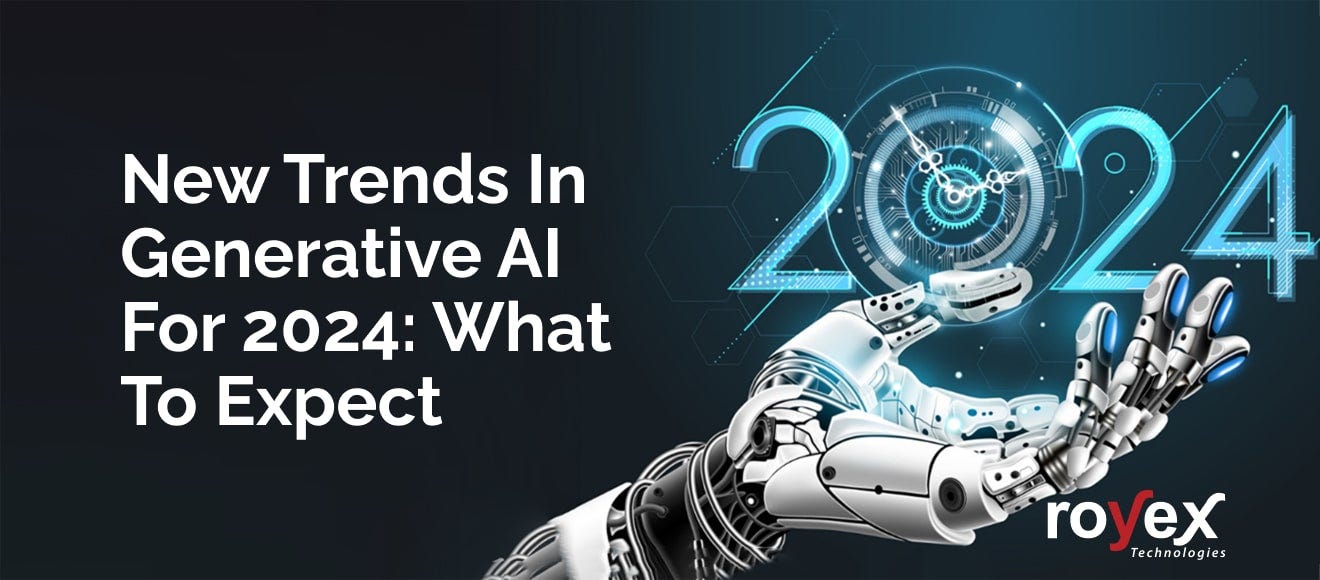As 2024 dawns, the artificial intelligence (AI) world is abuzz with predictions and trends that promise to shape the industry in the coming year. From smaller, more efficient AI models to the role of deepfakes in elections, here’s a concise look at what experts are forecasting for the AI landscape in 2024.
Smaller AI models at the edge
Amelia Armour, a partner at Amadeus Capital Partners, predicts a significant shift towards deploying smaller AI models at the edge of networks. These high-performance models require minimal computing power and are set to accelerate industrial automation. For instance, this development will benefit autonomous robots in distribution centers, leading to increased productivity.
Supercharged data centers
To keep up with the growing demand for AI computing power, data centers are expected to focus on improving network speeds while simultaneously managing energy consumption and heat generation. Innovations such as photonic chips for high-speed data transfer and more efficient cooling approaches will likely gain prominence in 2024.
Open source and efficient models for enterprises
Peter Sarlin, CEO and co-founder of Finnish AI startup Silo anticipates a preference for smaller, cost-effective, and specialized AI models for various language model use cases. Open-source models are set to empower this shift, making it more accessible for businesses to harness the power of AI. This transition aligns with the broader trend of integrating AI models into software products, creating new features within existing frameworks.
Deepfakes in elections
Nathan Benaich, founder of Air Street Capital, suggests that deepfakes may play a role in political elections 2024. While their impact on politics has been limited thus far, rapid advancements in deepfake technology may lead to malicious attempts during the presidential election. The potential consequences are significant enough to warrant regulatory investigations, regardless of their actual influence on the outcome.
New funding structures
Nathan Benaich also highlights the need for innovative funding structures for compute-intensive startups. High valuations and dilutions associated with large financings are becoming the norm. Some companies are already collateralizing debt finance with their graphics processing units (GPUs). In 2024, forward-thinking financial institutions may work to normalize this practice, providing a more sustainable funding approach.
AI governance debate
Contrary to expectations, Rick Hao, principal at Speedinvest, foresees a cooling down of the global AI governance conversation. While significant discussions have taken place, genuine alignment between Western democracies and China on AI governance remains elusive. Rick does not anticipate follow-up meetings making the same impact or concrete government actions in this regard.
AI safety investment opportunity
AI safety has gained prominence in recent years, and Rick Hao predicts it will continue to be underinvested compared to AI capabilities. As businesses rush to adopt advanced AI technologies, questions surrounding transparency, trust, and governance will become increasingly crucial. Investments in AI safety measures will be essential to ensure the responsible deployment of AI.
Rick Hao also asserts that the rate of AI advancement is accelerating, surpassing many people’s expectations. Breakthroughs like Google DeepMind’s recent material science discovery exemplify the surprising developments AI can bring. In 2024, the industry can anticipate more groundbreaking innovations.
The emergence of AI agents, capable of autonomously executing actions rather than merely responding to prompts, is expected to remain a hot topic, especially in product development. The higher the level of agency AI possesses, the more economically valuable it becomes. This trend is likely to continue throughout 2024.
Multi-modal AI
Dmitry Galperin, general partner at Runa Capital, predicts that multi-modal AI models, capable of handling various content types such as text, images, sounds, and videos, will gain prominence in 2024. While these advancements are expected to captivate the general public, their adoption in enterprise settings may face challenges related to ethical concerns, security, and potential hallucinations.
Vanessa Cann, CEO and co-founder of German GenAI startup Nyonic emphasizes the growing importance of AI observability, data quality assurance, and protection. Ensuring trustworthiness in AI systems will be pivotal for widespread adoption. This may drive the exploration of novel computing technologies, including photonics interconnects and alternative architectures like neuromorphic and analog computing.
Specialized AI models for business
Vanessa Cann also anticipates a shift towards more specialized AI models in 2024. These models, tailored to different industry verticals and tasks, will be trained on industry-specific knowledge and jargon. This shift is expected to unlock more complex use cases, transforming the technological landscape and the workforce.
Lastly, companies that leverage foundation models are set to gain a competitive advantage in their respective industries. With the continuous improvement of foundation models, businesses can significantly enhance their productivity, efficiency, and innovation speed. Studies suggest up to 70% improvements, making AI-driven solutions a game-changer in how businesses operate.





